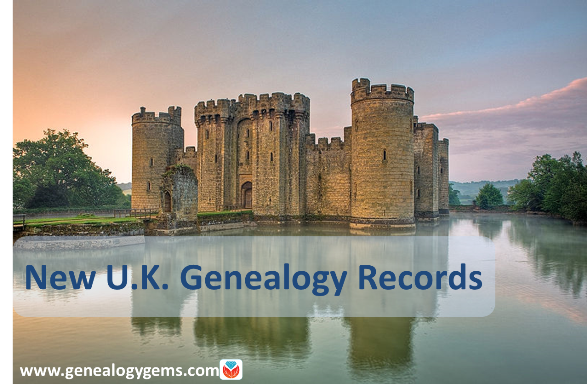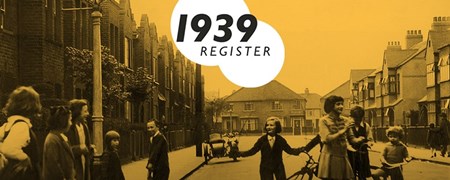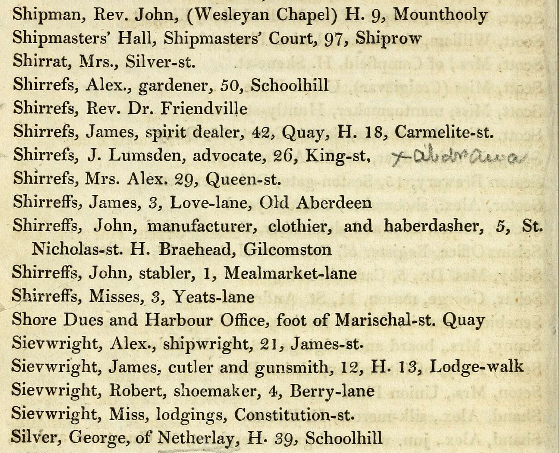New UK Genealogy Records Online: 1939 Register Updates and More
Got ancestors from England, Scotland, Wales or Northern Island? Check out these new UK genealogy records online: 1939 Register updates; newspapers; Scottish postal directories and local resources for Derbyshire and the city of York.

Featured Update: Additions to the 1939 Register online
 Over 660,000 new records pertaining to empty, uninhabited addresses across England and Wales have been added to Findmypast’s unique and important online 1939 Register resource.
Over 660,000 new records pertaining to empty, uninhabited addresses across England and Wales have been added to Findmypast’s unique and important online 1939 Register resource.
We asked Jim Shaughnessy at Findmypast how these records can help a researcher. “There are a few things that an empty address can tell you,” he responds. “Knowing the house you are looking for was an empty address in 1939 may help you to direct further research. As with other record sets, the occupations of the neighbors can give you an idea of the area (in terms of the largest local employer).”
The ability to search even vacant addresses “can also give you information about areas [later] destroyed by aerial bombing during the War (and during the extensive regeneration in the decades following),” writes Jim. “The Register was compiled September 1939; bombing began in 1940 and a lot of houses wouldn’t have been rebuilt, particularly in impoverished areas where we had bombsites for years and years afterwards. So from that you could look at how the War changed that area or that street: what doesn’t exist now but did pre-Blitz.”
Jim also pointed out that “Findmypast is the only site on which you can search by address on the 1911 census as well as the 1939 register, plus we have the largest collection of electoral rolls, also searchable by address. You can search by address and then build the entire picture of what your family did.”
More UK Genealogy Records Now Online
U.K. Newspapers
The British Newspaper Archive recently added four new titles: the Willesden Chronicle, published in London and the Warrington Guardian, published in Cheshire; the Dudley Herald [Dudley, West Midlands, England] and the Monitor, and Missionary Chronicle, of the Reformed Presbyterian Church in Ireland [Belfast, Northern Ireland]. The British Newspaper Archive now holds over 19.5 million pages of historic newspapers dating from the early 1700s to the early 2000s!
In addition, Findmypast has added over 186,000 records to its collection, Sussex, Eastbourne Gazette Newspaper Notices. “This indexed collection includes names found in the paper’s family notices section (announcements of births, marriages, and deaths) as well as other reports on events such as divorces, murders, tragedies, shipwrecks, lynchings, and paternity cases. The newspaper reported on stories in Sussex, but also internationally.”
Derbyshire, England. Over 800 records have been added to Findmypast’s unique collection of Derbyshire Hospital Admissions and Deaths 1855-1913. “The collection now contains over 5,000 records taken from two different sources: Derbyshire Royal Infirmary, Deaths 1892 – 1912 and Victoria Memorial Cottage Hospital, Ashbourne Admissions 1899 – 1913,” states an announcement. “Each record includes a transcript produced by the Ancestral Archives of Derbyshire. Records can include the patient’s admission date, reason for admission, condition after admission, marital status, residence, rank or profession, date of discharge or death, and cause of death.” Looking for other Derbyshire ancestors? Click here to read about online Methodist records for Derbyshire.
York, England. A new Findmypast resource, The York Collection, includes nearly 300,000 genealogical records documenting over 600 years of residents of the city of York. A press release calls it “the largest online repository of historic City of York records in the world….Fully searchable transcripts of each original document are also included, enabling anyone to go online and search for their York ancestors by name, location, and date.”
The collection is comprised of a variety of fascinating documents, including hearth & window tax records (1665-1778); lists of apprentices and freemen (1272-1930); city of York trade directories; electoral registers (1832-1932), city of York school admission registers; city of York deeds registers (1718-1866); city of York militia & muster rolls (1509-1829), and city of York calendars of prisoners (1739-1851). This collection was published in partnership with Explore York.
Scotland Directories

A snippet from an 1820s post office directory for Aberdeen and vicinity. Image on Findmypast.com.
Over 180,000 new record images have been added to Findmypast.com’s collection of Scottish post office directories, now spanning 1774-1942. The collection has nearly 900 browse-only volumes of directories that offer descriptions of Scottish towns along with lists of residents by occupation and address.
Here’s a little background from Findmypast: “Post directories are an excellent source for family historians wanting to trace ancestors on a yearly basis. Directories allow you to fill in the gaps between the census records. They can also provide vital information about your ancestor’s residence, which can lead to the discovery of more records….Directories can add historical context to your ancestor’s story. Directories will give you a better understanding of where your ancestor lived, such as how many businesses were in the town, how many schools, what day was the market day, and how big was the town.”
“Directories may focus on a particular town or district or you can find national postal directories. The majority of post directories comprise a description of the place, along with lists of people by occupation. For example, you will find lists of magistrates, councillors, sheriffs, police officers, and merchants. It is important to remember that post directories are not complete lists of all the residents in the town or county. Also, many directories fail to include women.”
TIP: A browse-only collection of digitized Scottish post office directories for 1773-1991 is available to search for free online at the National Library of Scotland.
Start researching your English ancestors with this free two-part article series:
 British Research for Beginners (“English” v. “British” and more)
British Research for Beginners (“English” v. “British” and more)
English Parish Records: Finding English Ancestors Before 1837




